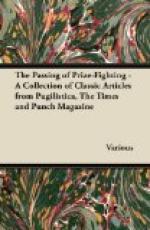* * * * *
It is a tribute at once to the art of her treatment and the actuality of her theme that, after reading the delicate little study of modern romance that ELIZABETH ROBINS PENNELL calls The Lovers (HEINEMANN), I cannot determine whether the clever writer was reproducing or inventing—she begins so convincingly with the statement that it was her first chapter, itself an article in The Century, describing the life of The Lovers as she watched it from her window, that brought about her friendship with the originals, and thus her knowledge of their further history. Anyhow, true or not, it is the kind of story that has been going on all round us in these days of love and heroism. Mrs. PENNELL first began to watch her pair of amoureux in their attic, which was overlooked from her higher window (most readers could probably make a shrewd guess at its postal district) in those seemingly so distant years when the young champions of artistic London used to meet at a certain cafe, wonderfully clad, to consume vast quantities of milk. Then came the War; the boy-husband enlisted, went to the Front—and the end is as we all have known it many and many times. In this little book the too familiar story is given with a restraint and absence of striving after effect that leave me, as I say, uncertain whether its appeal is due to art or actuality. But in either case Mrs. PENNELL has told it very well.
* * * * *
“Father, what is the difference between Tories and Radicals?” “Radicals, my dear, are the infamous crew who wish to destroy all the noble institutions for which the Tories would give their life-blood.” “And which are you, Father?” I have inflicted this ancient (and, I always think, rather touching) scrap of dialogue upon you because it exactly illustrates my impression of The Soul of Ulster (HURST AND BLACKETT). In other words, this little book, written as ably and attractively as you would expect from the author of The First Seven Divisions, is really less a dispassionate survey of the Home Rule difficulty than a piece of special pleading for the Northern cause. According, therefore, to your own attitude towards this problem will characters occupies her rural stage—an old grandmother, be your estimate of Lord ERNEST HAMILTON’S arguments. To the bigoted (or confirmed) Orangeman they will seem revelation; to the confirmed (or bigoted)




